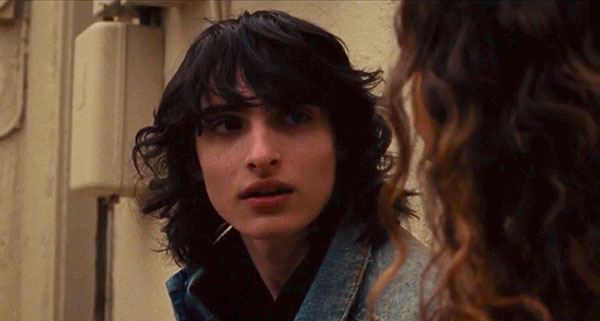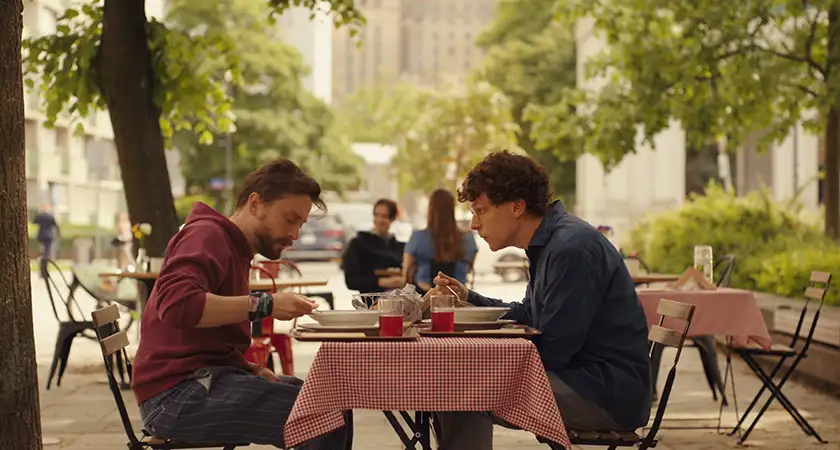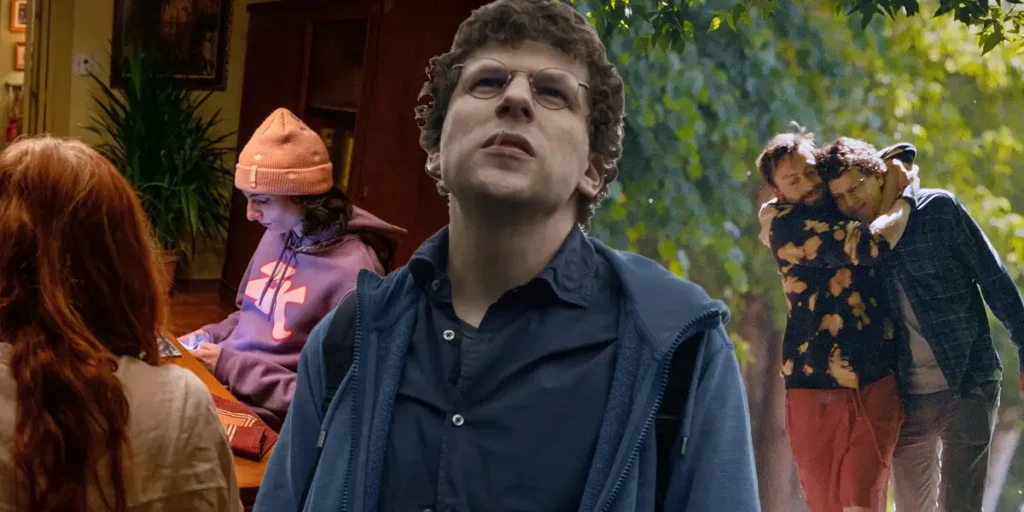A Real Pain fortifies director Jesse Eisenberg’s creative focus, in another film that, like When You Finish Saving the World, has family relationships at its epicenter.
In 2022, Jesse Eisenberg’s directorial debut When You Finish Saving the World premiered at the Sundance Film Festival. Two years later, Eisenberg is back on the festival circuit with his second feature film, A Real Pain. On the surface, these movies seem to have nothing in common, differing in plot and tone, but they actually lend themselves to what seems to be emerging as Eisenberg’s creative focus: complex familial relationships.
A Real Pain’s Cousins Turned Best Friends Dynamic

Eisenberg’s latest film, A Real Pain, centers around the dynamic of cousins David (Eisenberg) and Benji (Kieran Culkin, of Succession). The two men, who were raised more like brothers than cousins, reunite for a trip to Poland in honor of their cherished grandmother who has recently passed on. In her will, she left money for the boys to take this trip to see where their family came from. They join a tour group of five other people, all traveling to Poland for different reasons but with the same motive: to understand the part this place plays in their history.
David and Benji could not be more different. David is a tightly wound collection of nervous eccentricities, exacerbated by a long-standing history of OCD. While David lives in Manhattan with his wife and child, working a stable job, his cousin Benji stands as one of David’s constant sources of worry. Benji is the definition of effervescent. He oozes charm and charisma, having a natural way with people and a deep desire to connect to the world around him. However, for all that he has going for him, he lacks the drive David possesses. There’s a disconnect between his easy-going and empathetic nature and his ability to actualize it into something he can make a life doing. Benji lives in his mother’s house in Binghamton, New York with no job nor romantic life to speak of. Benji was the person in the family most devastated by his grandmother’s death. While she instilled fear in others, she was Benji’s favorite person and best friend, having weekly phone calls with him to catch up and acting as his biggest cheerleader.
When the film begins, the anxiety David has about the trip is palpable. As he’s rushing to get to the airport, he leaves Benji a string of increasingly anxious messages to ensure he will be there at their agreed-upon time. Benji’s refusal to answer his phone causes David to spiral, but upon his arrival, he is greeted by a carefree Benji who has been waiting at the airport for hours. This opening sequence perfectly epitomizes their dynamic. David worries constantly about making sure everything is going to plan and Benji breezes in without a care in the world, making the entire room fall in love with him without any effort involved.
David has always looked at Benji with admiration and, at times, jealousy. He’s never gotten to be the guy who lights up a room or connects with strangers on the TSA line. However, as the film progresses David and the audience come to realize Benji’s gift for connection has intensive emotional strings attached. While Benji easily connects with the entire tour group almost immediately, the trip through his grandmother’s home country with a deeply painful history takes a horrible emotional toll on Benji.
Their Jewish grandmother was able to survive the Holocaust through a string of miracles and while the tour of Poland is supposed to connect David and Benji with their family’s roots, it also connects them to an unthinkable tragedy their family suffered. Benji’s ability to connect with others is tied to his ability to feel deeply. He often takes out his feelings of pain, frustration and sadness in front of the tour group. His behavior becomes increasingly more erratic and unpredictable as the tour explores the depth of Poland’s historied darkness.
This causes a growing resentment between David and Benji, as Benji gets frustrated at David, and the rest of the tour group, for not feeling the emotional weight of the tour in the same capacity. It’s clear that Benji is still grieving his grandmother and cannot comprehend the idea that pain and grief are emotions you’re expected to move on from. While I do believe the emotional weight of the trip has a toll on Benji, it feels like he has found a more socially acceptable avenue to express his grief through.
David, on the other hand, can’t wrap his head around this. He believes the pain and suffering he has endured are unremarkable and undeserving of attention. This is the crux of the tension in David and Benji’s relationship. Benji feels so deeply it leaves no room for David to. David is constantly forced to be the rock of their dynamic and take care of Benji. While David truly loves Benji, since the passing of their grandmother David has been spending time with Benji out of a tense obligation. He is doing everything in his power to make sure Benji is alright, rather than genuine desire and Benji knows it. Benji wants David to dive into these feelings of pain and David wants Benji to understand the emotional strain his carefree attitude forces David to take on.
When You Finish Saving the World’s Complex Mother-Son Relationship

Eisenberg’s first feature, When You Finish Saving the World, focuses on the relationship between Evelyn (Julianne Moore, of The Room Next Door) and her son Ziggy (Finn Wolfhard, of Stranger Things). Evelyn works as the head of a women’s shelter and although she acts as a vital and selfless member of her community, she does not have the most friendly demeanor. Her curt speech and logical thinking create a distance between her and the people around her, particularly her son Ziggy.
While he would recoil at the comparison, Ziggy has an equally challenging personality to get along with. While widely popular on the fictitious social media site “Hi-Hat”, boasting an impressive 20,000 followers, Ziggy cannot seem to translate the likeability of his online presence to his real-life one. Ziggy, being a typical teenage boy, sees Evelyn as more of an adversary than a mother. Evelyn has no basis for understanding how hard Ziggy worked to build his online presence and his passion for songwriting.
Unable to connect with one another, but longing for someone to see them in the ways they feel the other cannot, Evelyn and Ziggy develop obsessions with others. For Evelyn, this manifests in a fixation on a promising young boy who comes through the shelter named Kyle (Billy Bryk, of Ghostbusters: Frozen Empire). Ziggy, on the other hand, only seems interested in speaking with his mom to ask her for advice on how to impress his politically informed school crush Lila (Alisha Boe, of Do Revenge).
Throughout the film, Evelyn and Ziggy struggle to find common ground with one another. When one pushes, the other one pulls and both refuse to acknowledge the efforts of the other. While on the surface Evelyn and Ziggy may come across as unlikeable, it’s clear Eisenberg has just written them as morally complex. The film’s title seems to be a direct iteration of how Evelyn and Ziggy feel about one another. While not saying either character is right or wrong, they think of one another as selfish in their own ways. Ziggy thinks his mother favors the shelter over her life at home and Evelyn believes her son cannot see past his “silly” online persona.
During the scenes where they are arguing, there’s an understanding they are yelling at one another for their own shortcomings. Evelyn is angry Ziggy won’t take an interest in the life that exists outside of his computer, even though she can’t manage to split her focus between the shelter and her home life and often chooses to give it to the former. Ziggy wants quick and easy answers from his mother about how to be more politically engaged but resents her for pointing out that passion for social and environmental issues cannot be faked for surface-level conversations. The strain in their relationship stems from being too similar to one another and not allowing the other to evolve past the familial roles they have been cast in.
Eisenberg’s Creative Focus on Family

A Real Pain and When You Finish Saving the World play into the concept of familial obligation and love in an introspective way. They look at family as people we are born tied to, which makes it difficult for us to allow them to evolve and vice versa.
In When You Finish Saving the World, Evelyn and Ziggy are more similar than they will ever be able to admit. Both are stubborn and, at times, self-important but truthfully longing for someone to show a vested interest in meeting them on their level to connect. Evelyn’s purpose in life is to be a caretaker in many different capacities. Ziggy decides at 17 he no longer needs to be taken care of and so she goes searching for someone to care for that would actually appreciate her efforts. This inability to be acknowledged by the other drives a wedge between them, both wanting to prove to the other they don’t need their approval for evolution.
Ziggy wants to be taken seriously and not be infantilized by his parents anymore. On Hi-Hat, people see him in the way he wants to be seen. Even though he is far beyond the physical proximity of his 20,000 followers, he feels more connected to them as they are able to see him as Ziggy without any preconceived notions of who he is. They both seek connection but don’t know how to obtain it from one another, so they turn to the world outside of their nuclear family to find it.
In A Real Pain, both David and Benji cannot escape the other’s predetermined persona. To David, Benji will always be the carefree lost soul in need of direction. And to Benji, David will always be the uptight lightweight who can’t ever simply relax. It doesn’t mean they don’t love one another, but these ideas they can’t shake of each other create a strained tension between the cousins.
Both duos have to work against this. It’s not that they do not love each other; they were born loving one another, it’s more so that they feel like they need to earn the other’s approval. Their evolution into the next stages of their lives won’t be complete if they cannot get the people they love the most to get on board with who they want to become. It’s not that these characters want to stunt one another’s growth, it’s just that sometimes letting people grow and things that have been the same your entire life change is not an easy thing to do.
Benji misses David as just a cousin, not a father and a husband and a “real-life adult”. Evelyn misses her son as a son, not an angsty young man. Eisenberg’s creative focus in both his films being family creates this interesting commentary on loving someone versus accepting someone. When someone is family, it doesn’t really matter if you like them because you grow up being told you love them. There’s an obligation to family that doesn’t exist in other types of relationships.
However, while both pieces of Eisenberg’s work show the pitfalls and complications of familial relationships, they also show how pure the love in them is. While David and Benji and Evelyn and Ziggy respectively drive each other crazy, they also show up for each other without question.
I believe when your family is the one constant in an endlessly evolving life, it’s hard to accept change in any form from them. However, both of Eisenberg’s films show why it is important. His films give grace and depth to familial relationships and show the intense emotional payoff in allowing others to evolve, not holding them to a singular aspect of their personality or version of themselves.
Eisenberg has found a strong core to his pursuits as a writer-director. A Real Pain not only beautifully fits into his creative expertise but shows his creative evolution with more nuanced characters and the ability to be playful while still having total control over tone. While his next project has yet to be revealed, given the growth from his first film to his second and his fascinating dissection of family relationships, I can confidently say I will be seated.
A Real Pain will be screened at the New York Film Festival on October 5-13, 2024 and will have its UK premiere at the BFI London Film Festival on October 13, 2024. The film will be released in US theaters on November 1, 2024 and in UK and Irish cinemas on January 10, 2025. When You Finish Saving the World is now available to watch on digital and on demand.

